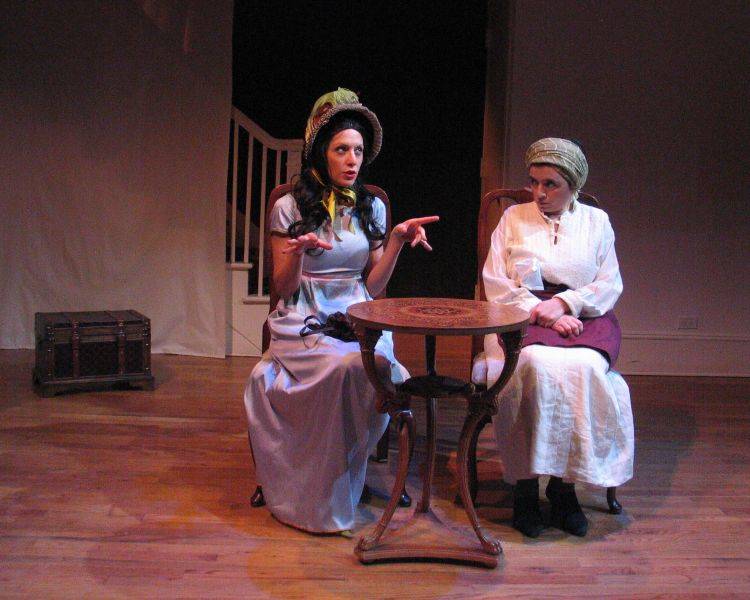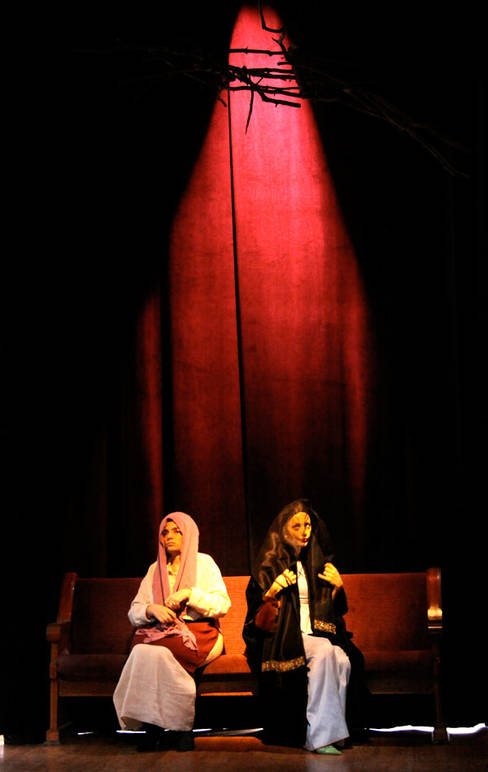Tosca and the Two Downstairs
The audience of Giacomo Puccini’s Tosca might not necessarily imagine its historical context: Rome in Napoleon’s times, still intensely clerical and almost autocratic, with very few repressed liberals that remotely envisioned the Risorgimento to come. But that’s precisely the subject of Franca Valeri’s play Tosca and the Two Downstairs recently produced by Teatro Kairos, the Italian stage company based in New York and managed by Laura Caparrotti, who also directs the play.
To reveal the feelings of the common people in Rome at the time – those who are excluded from the privileges of melodramatic action and operatic arias – it takes only two women on stage: Emilia, porter of Palazzo Farnese and wife to a prison guard at Castel S. Angelo, and Iride, Sciarrone’s dissatisfied and merry wife from Lombardy, who enters Emilia’s lodging on the very night when Cavaradossi is captured and tortured. A comic contrast emerges between the woman from Rome, deeply clericalist and fond of Baron Scarpia even in his most villain acts (and yet skeptical, disenchanted, and at times deeply compassionate), and the Lombard bride, whose ostentatiously merry flair desperately tries to cover her dissatisfaction with being a torturer’s wife in strict, papal Rome.
The two characters clearly resemble some of the many comedic types that the Italian author and comedian Franca Valeri enacted during her lifelong career: the snobbish young lady from Milan, harping on her sexual desires while speculating on Mr. Right and, and the curt and edgy Mrs. Cecioni from Rome. In Tosca and the Two Downstairs, the characters crucially probe a setting which, deprived of Puccini’s soothing music and of the cathartic empathy of melodrama, shows its disquieting contradictions. In longing for her former life as an admired (and a little loose) provincial stage starlet, Iride clearly compares her own disquiet to that of Tosca: after all, Iride too lived for art and love, in her own way. Dejection and tragedy are not just for the prima donna. Similarly, Emilia can hardly keep together her stern admiration for Baron Scarpia’s violent display of power – a harsh side of the character, if considered alongside current events not only in Italy – and her disenchanted compassion for the tortured prisoners (she is a wife and mother, after all). Being the porter at Palazzo Farnese might be dignifying, but it also needs callousness, most likely against Emilia’s own will. The text’s depth comes out in the dialogue’s quick and pungent wit, a true testimony of Franca Valeri’s outstanding talent.
Kairos Italy Theater’s remarkable production of Tosca and the Two Downstairs thoroughly grasps the manifold meaning of the play. The spare – and yet extremely appropriate – décor of the set properly props the clockwork interaction between Emilia and Iride, respectively played by Laura Caparrotti (who is also the director) and Marta Mondelli. Caparrotti’s skillfully unadorned and almost solemn gestures – keenly studied on the Roman popolana beyond Valeri’s onw renditions – are timely matched by Mondelli’s extroverted reconstruction of the Lombard starlet. The vernacular interjections peppering the characters’ witty retorts might suit better the Italian speakers, but the English supertitles appropriately render the nuances of the play nonetheless. It was high time that a modern and intelligent Italian comedy like Valeri’s Tosca and the Two Downstairs were produced. Thanks to Laura Caparrotti for having once again done the right thing.
Tosca e le Altre Due
(Tosca and the Two Downstairs)
by Franca Valeri
Translated by Natasha Lardera
With: Marta Mondelli and Laura Caparrotti
And Rocco Sisto (Voice Over)
Directed by Laura Caparrotti
Set Designer: Lucretia Moroni
Music: Giacomo Puccini
In Italian with English Supertitles
To 21 Febbraio
The Cell, 338 W 23rd Street, Manhattan
Second week: Fri 12- Sat 13 at 8:00 PM, Sat 13 and Sun 14 at 3:00 PM
Third week: Wed 17 - Sat 20 at 8:00 PM, Sat 20 and Sun 21 at 3:00 PM
Tickets $ 20.00 - $ 15.00 Students, Seniors and IIC Members showing ID card at box office
Box office: www.brownpapertickets.com, 800-838-3006
Running time 1:15








































i-Italy
Facebook
Google+
This work may not be reproduced, in whole or in part, without prior written permission.
Questo lavoro non può essere riprodotto, in tutto o in parte, senza permesso scritto.